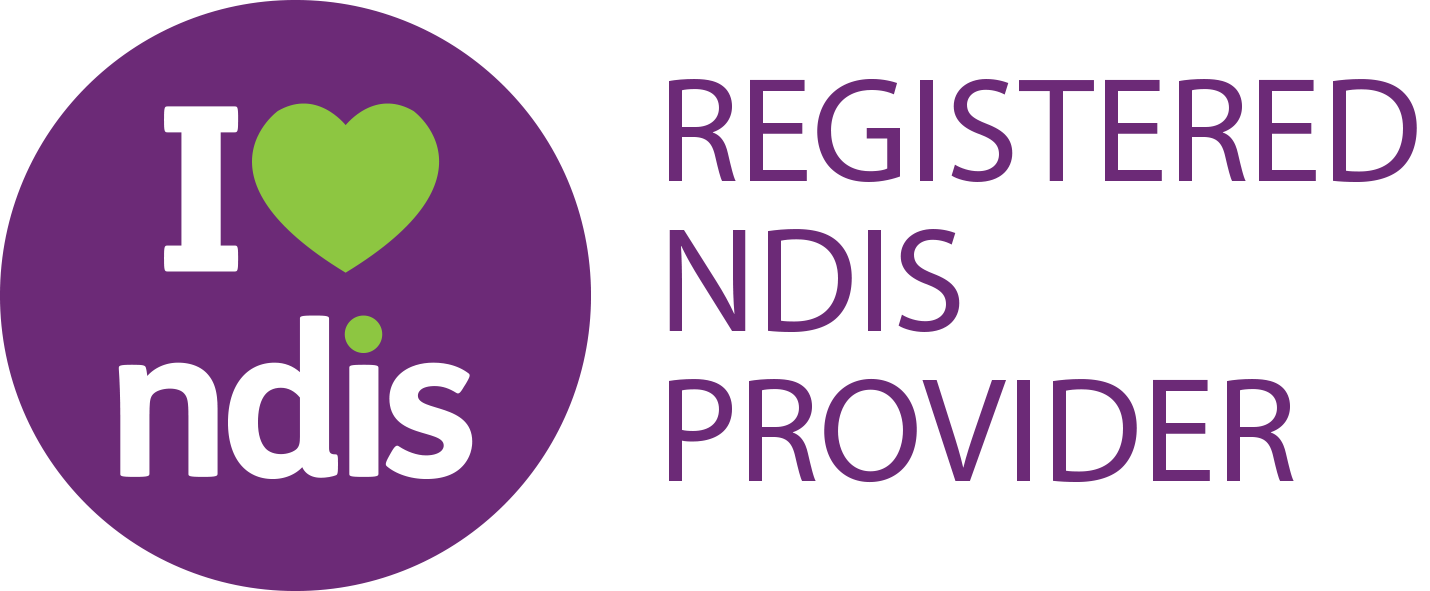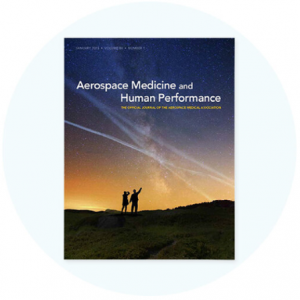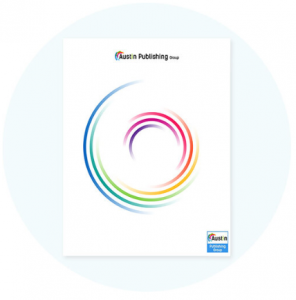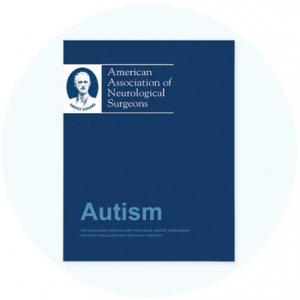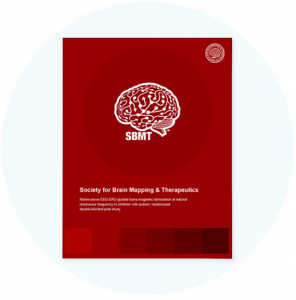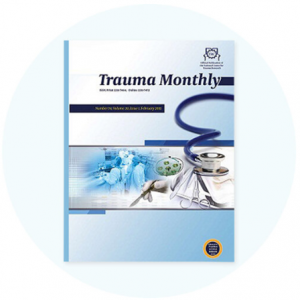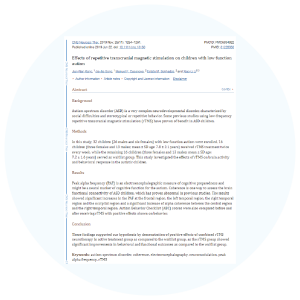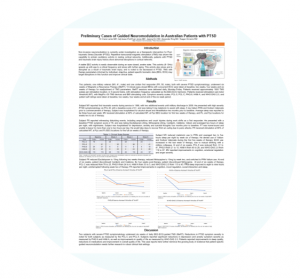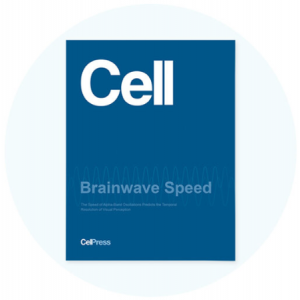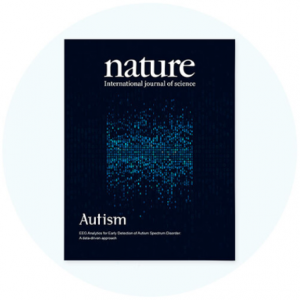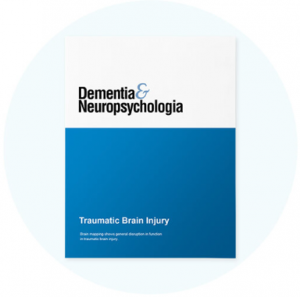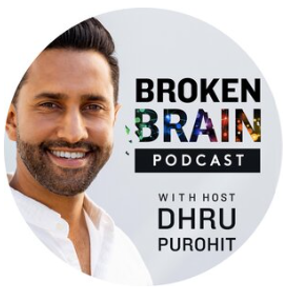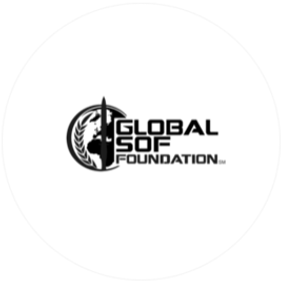Research & Resources
The MeRT℠ approach is based on powerful third-party research.
Positive outcomes continue to emerge from Australian and international research in support of MeRT℠ Brain Treatment technology and its benefits. Below you’ll find peer-reviewed research that builds the foundation of our approach to brain therapy.
Research supporting MeRT℠
Aerospace Medical Association
Magnetic E-Resonant Therapy alleviates combat related post-traumatic stress disoder
Why is this important? MeRT℠ may be a promising adjunctive treatment to help veterans suffering from PTSD.
Springer
Magnetic resonance therapy improves clinical outcomes in children with autism spectrum disorder (ASD)
Why is this important? There is a growing consensus on the need for evidence on individualised non-invasive neuromodulation protocol in the form of MeRT℠ in improving clinical outcomes of children with ASD.
Autism Publish Group
The Potential of Magnetic Resonant Therapy in Children with Autism Spectrum Disorder
Why is this important? MeRT℠ may be a therapeutic option to pursue given EEG abnormalities in children with ASD.
American Association of Neurological Surgeons
Improved autism behaviors after non-invasive brain transmagnetic stimulation using custom rate modulation: 24-month follow up
Why is this important? A review of the table of ASD patients receiving MeRT℠ (141 patients) was performed. Clinical improvement was observed in most patients: Class I research data is necessary to confirm these data.
Society for Brain Mapping & Therapeutics
Noninvasive EEG-EKG trans-magnetic stimulation at natural resonance frequency in children with autism: randomsied double-blinded pilot study
Why is this important? MeRT℠ may impart EEG and clinical changes in children with ASD, with more research necessary at this time.
Trauma Monthly
Magnetic resonance therapy improves clinical phenotype and alpha power of EEG in post-traumatic stress disorder
Why is this important? Data suggests that non-invasive neuromodulation in the form of MeRT℠ Therapy may lead clinical improvements as well as trends towards normalization of EEG.
CNS Neuroscience & Therapeutics
Effects of repetitive transcranial magnetic stimulation on children with low‐function autism
Autism spectrum disorder (ASD) is a very complex neurodevelopmental disorder, characterized by social difficulties and stereotypical or repetitive behavior. Some previous studies using low‐frequency repetitive transcranial magnetic stimulation (rTMS) have proven of benefit in ASD children.
Elsevier
The potential of repetitive transcranial magnetic stimulation for addressing sleep difficulties in children with autism – A brief communication
Other MeRT℠ Supporting Documents
Results Poster
Preliminary Cases of Guided Neuromodulation in Australian Patients with PTSD
Documents Supporting EEGs
CellPress
The Speed of Alpha-Band Oscillations Predicts the Temporal Resolution of Visual Perception
Why is this important? Brainwave speed and specific function relates to processing speed.
Nature
EEG Analytics for Early Detection of Autism Spectrum Disorder: A data-driven approach
Why is this important? Brain mapping shows high predictability of Autism.
Dementia & Neuropsychologia
Traumatic brain injury An EEG point of view
Why is this important? Brain mapping shows general disruption in function in traumatic brain injury.
Supporting News and Articles
Broken Brain Podcast
A New Way to Treat PTSD, Concussions, and Traumatic Brain Injuries with Dr. Erik Won
Defense One
Electric Therapy is Curing Navy SEALs of PTSD … and Could Remake Brain Science
Global Special Operation Forces Foundation
A Unique Treatment for SOF Veterans with TBI and PTSD
The MeRT℠ approach is based on powerful third-party research.
Positive outcomes continue to emerge from Australian and international research in support of MeRTsm Brain Treatment technology and its benefits. Below you'll find peer-reviewed research that builds the foundation of our approach to brain therapy.
MeRTsm for PTSD
Research:
Taghva et al, Non-invasive EEG-EKG in Veterans with PTSD Randomized Double-Blinded Pilot Study
Defence media article:
US Special Operations Forces Personnel MeRT experience
MeRTsm for Autism
Research:
MeRTsm for Anxiety
The MeRT℠ approach is based on powerful third-party research.
Positive outcomes continue to emerge from Australian and international research in support of MeRTsm Brain Treatment technology and its benefits. Below you'll find peer-reviewed research that builds the foundation of our approach to brain therapy.
MeRTsm for PTSD
Research:
Taghva et al, Non-invasive EEG-EKG in Veterans with PTSD Randomized Double-Blinded Pilot Study
Defence media article:
US Special Operations Forces Personnel MeRT experience
MeRTsm for Autism
Research:
MeRTsm for Anxiety
